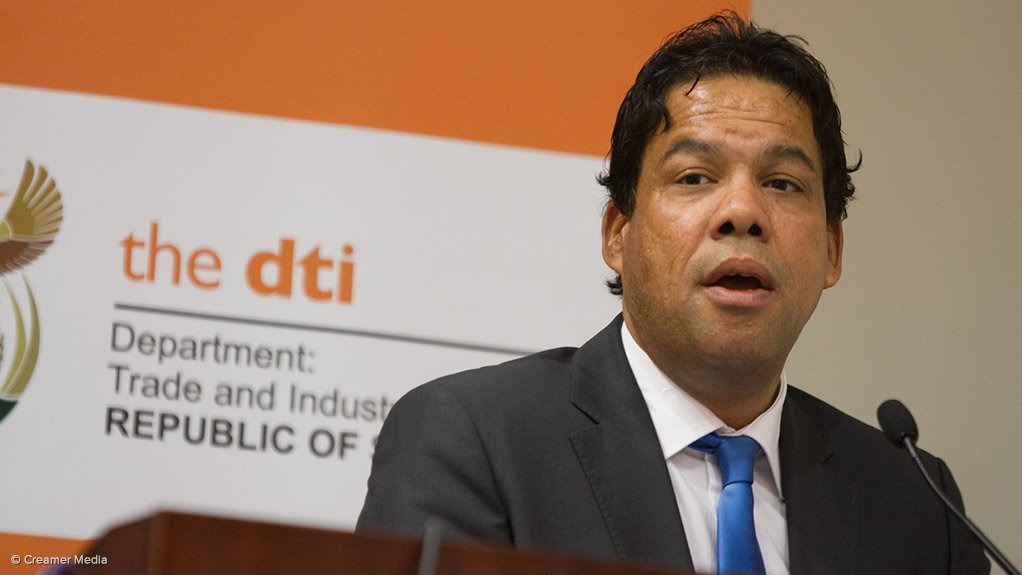New agroprocessing-, metals-focused Ipap to be released in April


LIONEL OCTOBER The DTI is emphasising the importance of the fourth industrial revolution and modernising and upgrading the metals and casting industries
Photo by Duane Daws
A new Industrial Policy Action Plan (Ipap), focused on supporting the agroprocessing and metals industries, including foundries and the casting sector, will be released in April, Department of Trade and Industry (DTI) director-general Lionel October says.
“We are aiming to strategically support the foundry and casting industries as the core of broader manufacturing activities, if the new plan is adopted by Cabinet,” October says.
The foundry and casting industries are core to various other manufacturing industries, including automotive, valves, construction and rail. The DTI aims to draw lessons from Germany and China about what they did to maintain, revive and support their metals industries, he says.
The need for a mix of supply-side and demand-side support is addressed in the new Ipap – the ninth iteration. However, the biggest part is focused on the demand side of the industry. There will be supply-side incentives in research and development (R&D), for instance, but the core initiative for the industry must be focused on the demand side, October says.
The designation of valves, which are strategic components in various industries, for local production using procurement protocols that large State-owned enterprises must abide by has had a significant impact on the valves manufacturing industry, with fewer exemptions granted to companies to import valves.
Simultaneous support to enable manufacturers to meet international original-equipment manufacturers’ (OEMs’) quality requirements has also enabled this, he says.
“Government is committed to local production and we must support local industry. We have designated rail rolling stock, valves and now steel as products that must be produced locally. Parastatals must buy these products locally, which creates base demand for the industry.”
October avers that government has the buy-in of large international OEMs, as evidenced by new investments in automotive manufacturing plants. Direct links between automotive manufacturers and local metals industries, such as the local aluminium industry, have been forged to ensure that the industries produce components and materials to the required international standards.
There is strong emphasis on local components manufacturing and the creation of strong backward links to the broader sector to ensure that the entire supply chain is supported to meet the required standards of production and quality, he adds.
The DTI is cooperating with the Council for Scientific and Industrial Research (CSIR), the National Foundry Technology Network – hosted at the CSIR, and majority-funded by the DTI – and the Department of Science and Technology, as well as mining research organisation Mintek, to expand supply-side support for local metals and components manufacturing as the manufacturing industry moves into the fourth industrial revolution.
“In the next Ipap, [version nine], we are emphasising the importance of preparing for the fourth industrial revolution and supporting the metals and casting industries to modernise and upgrade. Information and communication technologies, the Internet of Things and three-dimensional printing technologies are part of the major convergence of technologies in the sector.
“We need to support and collaborate with the CSIR and R&D organisations to train the youth and provide strong support for human resource development and R&D support, as well as other strong supply-side support, specifically in the form of incentives for the metals and agroprocessing industries, to modernise and grow.
“This, along with demand-side initiatives, such as local procurement designations, will help to grow demand for products from these industries,” says October.
Article Enquiry
Email Article
Save Article
Feedback
To advertise email advertising@creamermedia.co.za or click here
Announcements
What's On
Subscribe to improve your user experience...
Option 1 (equivalent of R125 a month):
Receive a weekly copy of Creamer Media's Engineering News & Mining Weekly magazine
(print copy for those in South Africa and e-magazine for those outside of South Africa)
Receive daily email newsletters
Access to full search results
Access archive of magazine back copies
Access to Projects in Progress
Access to ONE Research Report of your choice in PDF format
Option 2 (equivalent of R375 a month):
All benefits from Option 1
PLUS
Access to Creamer Media's Research Channel Africa for ALL Research Reports, in PDF format, on various industrial and mining sectors
including Electricity; Water; Energy Transition; Hydrogen; Roads, Rail and Ports; Coal; Gold; Platinum; Battery Metals; etc.
Already a subscriber?
Forgotten your password?
Receive weekly copy of Creamer Media's Engineering News & Mining Weekly magazine (print copy for those in South Africa and e-magazine for those outside of South Africa)
➕
Recieve daily email newsletters
➕
Access to full search results
➕
Access archive of magazine back copies
➕
Access to Projects in Progress
➕
Access to ONE Research Report of your choice in PDF format
RESEARCH CHANNEL AFRICA
R4500 (equivalent of R375 a month)
SUBSCRIBEAll benefits from Option 1
➕
Access to Creamer Media's Research Channel Africa for ALL Research Reports on various industrial and mining sectors, in PDF format, including on:
Electricity
➕
Water
➕
Energy Transition
➕
Hydrogen
➕
Roads, Rail and Ports
➕
Coal
➕
Gold
➕
Platinum
➕
Battery Metals
➕
etc.
Receive all benefits from Option 1 or Option 2 delivered to numerous people at your company
➕
Multiple User names and Passwords for simultaneous log-ins
➕
Intranet integration access to all in your organisation


















